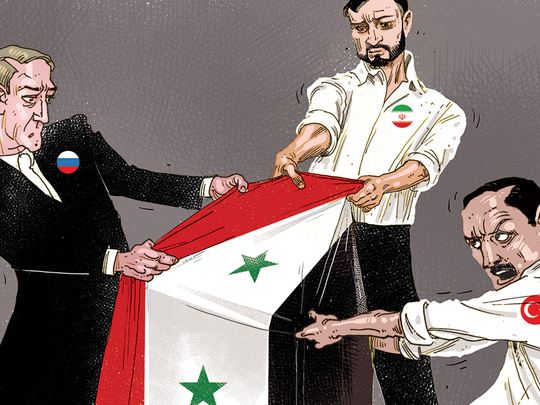
The new common front on the Syrian civil war between Turkey, Russia and Iran is an extraordinary event for the Middle East. The total exclusion of the United States shows how radically things have changed in only a few years from when such an initiative could not have happened without a lead from and participation by the US.
The three players are also very unlikely participants in mainstream Arab politics. Turkey has deliberately kept out of Arab entanglements for decades and Russia has been unable find any traction since the fall of former president Saddam Hussain in Iraq when it lost its last toehold in the region. Iran has built a substantial position in several countries through its meddling, but it has worked through proxy militias and local forces that it subverts to follow its nationalist needs. This new initiative will be the first time that it comes on the stage as a major regional and international player.
The US may remain the leader of the international coalition fighting Daesh (the self-proclaimed Islamic State of Iraq and the Levant). But this has been sidelined in Syria by the ongoing war between the different Syrian elements, which allows Daesh to continue to hold its capital Raqqa in the north of the country after more than two and-a-half years.
The exclusion of the US from the action to seek an end to the Syrian civil war must embarrass the current administration despite its brave words that it was not worried about being left out of the discussion and that it welcomed any solution that will “lead to a reduction in bloodshed ... whether or not we’re at the table”.
However, the new administration may be much more willing to work with this idea. Gerald Seib of the Wall Street Journal has reported Trump, saying: “We will stop looking to topple regimes and overthrow governments, folks.” After wasting “$6 trillion” (Dh22 trillion) in Middle East fights, he said, “our goal is stability not chaos”.
Seib says that these words indicate that a Trump presidency may seek:
n An end to the effort to oust Syrian President Bashar Al Assad, for the effort to throw out Al Assad is nothing if not an effort to topple a regime.
n A partnership with Russia in the region, for Russian President Vladimir Putin certainly has demonstrated he is “willing to join in the effort” to defeat Daesh in Syria.
n A warmer relationship with Egyptian President Abdul Fattah Al Sissi, who has demonstrated an unmistakable ferocity in his own fight against extremism, while also being largely shunned by the administration of US President Barack Obama.
n A policy towards Iran that doubtless will be hostile and include an attempt to dissolve the Obama-negotiated deal on nuclear arms, but one that will not include regime change in Tehran as an explicit goal.
Building a substantial position
The trio of new allies will have their problems. Turkey is deeply suspicious of Hezbollah and what it is doing in Syria while apparently fighting only to back Al Assad, but also possibly building a substantial position for Iran, but Turkey’s new friends seem eager to avoid an argument on the subject. They also all agree that “the No 1 priority shouldn’t be regime change, but the task of suppressing the terrorist threat”, according to Russian Foreign Minister Sergei Lavrov.
Iranian Foreign Minister Mohammad Javad Zarif agreed when he said, “We have a common position on this” and announced that the three were ready to invite the Syrian government and opposition for peace talks in Kazakhstan. Despite the sudden agreement all round, the real difficulties will start when the three new allies have to define who is a terrorist, who they think should come to Kazakhstan, and who should be excluded from their agenda and to be bombed and attacked on the ground.
Mark Katz of George Mason University in his blog comments that there are all sorts of pressures on this deal. The Trump administration and Israel might come to see Russia as a partner both in Syria and in the Middle East, if Moscow is willing to expand its role from defeating the Syrian opposition in Syria to include limiting Iranian influence in the region. Similarly, Turkey will welcome any effort by Moscow to limit Kurdish influence in Syria as well.
Katz points out that Iranian press commentators have often complained that Moscow is always willing to sell out Tehran’s interests in exchange for a mutually satisfactory deal with Washington and he adds that even if Putin and Trump are genuinely interested in reaching an agreement on Syria, Iran will probably be in a position to block it. Which means the US administration will have to join the negotiations with Iran if the Syrian civil war is ever going to be resolved. But this is not something that the incoming Trump administration appears willing even to acknowledge, much less undertake.








